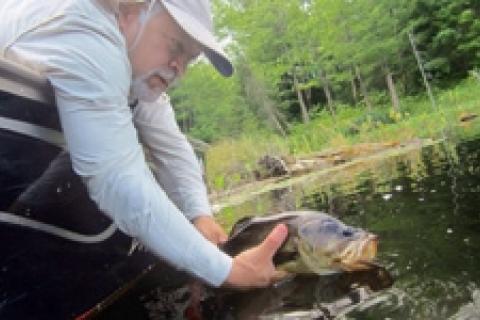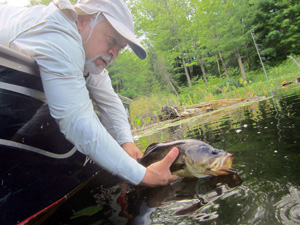
 If the catch and release ethic has any roots, it lies in fly fishing. Somewhere along the way, forward thinking anglers such as Lee Wulff put forth the idea that a fish is too precious to catch just once. This, it turns out, was a good thing and many of our world class fisheries can thank those anglers, along with sound scientific management, for their recovery. Certainly, lesser fisheries have benefited, too.
If the catch and release ethic has any roots, it lies in fly fishing. Somewhere along the way, forward thinking anglers such as Lee Wulff put forth the idea that a fish is too precious to catch just once. This, it turns out, was a good thing and many of our world class fisheries can thank those anglers, along with sound scientific management, for their recovery. Certainly, lesser fisheries have benefited, too.
I'm all for catch and release. But every now and then I don't mind a fish or two for the frying pan either. My family enjoys fish and so do I.
I know a few anglers that would drum me out of the fly fishing community for this, and I know several who feel the same way I do.
Those who are strictly catch and release anglers would tell me to go to the store and buy fish. Those who take a fish or two would suggest that if it is legal, it's no one's business but my own.
And that is at the heart of the matter.
Ethics are a personal thing. But they should be based on some serious consideration.
My views, for instance, land somewhere in the middle.
I release the vast majority of the fish I catch, but I typically keep a few every couple of weeks for a family meal.
How I decide what to keep — if not mandated by the regulations — is simple.
First, if I am fishing for wild trout, they go back, unless of course they are deeply hooked and not going to survive release.
If I am fishing for put and take trout, I'll keep one or two — every now and again. Regardless, I never keep a legal limit. Often, I might not keep any at all.
If I am fishing for panfish, I'll put any keeper I can on the stringer. That's because they are under pressured and incredibly prolific around here. And they taste great.
When fishing for all other species — in my area that means smallmouth and largemouth bass, pike, muskie and walleye — I'll keep pike because they are not native to our lakes and I'll release muskie because they are.
As for the rest, it goes like this: For bass and walleye, I release the big breeders without exception. For walleye, it's pretty simple. Our regulations already protect those critical fish by limiting the number over 18.1 inches we can keep.
For bass, I typically keep fish from 14 to 17 inches. While these are breeders, they are not the big hawgs that are the most successful and prolific. And generally in our lakes, these are typically released by other anglers looking for bigger fish.
All of this is tempered by the fishing pressure placed on the waters in question. If the fish get pounded, they get a break from me.
You probably have a different sense of how this should go. As I said, ethics are a largely personal matter. The point is that every angler ought to give catch and release some thought before they hit the water and decide where they land on it. And that thought process shouldn't be taken lightly.
Lastly, if you are going to keep fish, be ready for that eventuality by having a live well, stringer or cooler on hand for them. And know how to release a fish so that it survives. Wasting game either way is simply a crime.
- 4562 views

